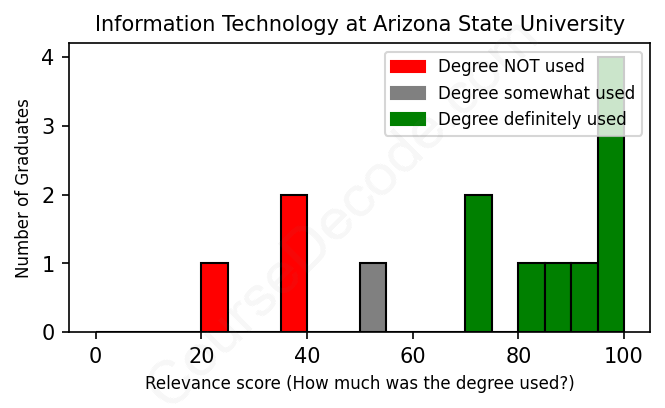
First, some facts. Of the Information Technology graduates from Arizona State University we've analyzed , here's how many have used (or NOT used) their degree in their career:

These are estimates based on AI analysis of 13 LinkedIn profiles (see below).
The verdict? Above average. Overall, with an average relevance score of 73%, Information Technology graduates from Arizona State University have a higher likelihood (+6%) of finding work in this field compared to the average graduate across all fields:
And for comparison, here's the chart for all profiles we've looked at across all degrees.
Also, after graduating, only 7% of these graduates have pursued further education other than another Bachelor's degree (such as a Masters degree or other), compared to the average across all profiles of 35%. This suggests a Bachelors degree is enough for most Information Technology graduates, and it's normal to look for work straight after graduation.
See the details:
|
Relevance score: 36% We think this person has NOT gone into a career related to their degree. We think this person has NOT gone into a career related to their degree.
DEGREE INFOGraduated in 2022 from Arizona State University with a Bachelor's degree in Information Technology. No other secondary education since. JOB HISTORY SINCE GRADUATIONCommunity Specialist - Part Time Section 8 Clothing Mar 2022 - Dec 2022 Licensing Coordinator  Sega of America, Inc. Jul 2022 - Present ABOUTNo information provided. |
The top 10 most common jobs done by the graduates we've analyzed (ranked most common to least) are:
When looking at the job paths of graduates from Arizona State University's Information Technology program, it's clear that a significant number of them have landed roles that are closely related to IT. Many have taken on positions like Information Technology Supervisor, Software Engineer, and System Integrator, which directly apply skills and knowledge acquired during their studies. These roles often require a solid understanding of IT principles and technical expertise, so graduates in these positions are likely seeing the value in their degree. In particular, software engineering roles seem to be popular, with multiple graduates working at companies like Raytheon Technologies, demonstrating a clear trend toward technical specialization.
On the flip side, not every job listed falls neatly within the IT realm. Some roles, such as Customer Service Representative and Community Specialist, do not require strong IT skills and instead focus on general customer service or non-technical responsibilities. This disconnect highlights that while many graduates are able to find relevant positions, a few end up in jobs that don't fully utilize their educational background. Overall, though, it's encouraging to see that many of these graduates are successfully leveraging their Information Technology degrees in careers that truly reflect their training and expertise.
Here is a visual representation of the most common words in job titles for Information Technology graduates (this is across all Information Technology graduates we've analyzed, not just those who went to Arizona State University):

From looking at the career paths of Arizona State University graduates in Information Technology, it's clear that many of them are starting strong in the tech field. For a lot of these grads, their first jobs straight out of school are often focused on foundational IT roles like IT Specialist, Information Technology Engineer, or even Software Engineer. These positions typically help them build essential skills and experience that set the stage for more advanced opportunities down the line. For example, one graduate went from being a Software Engineer at Modular Mining Systems to a Principle Specialist at Raytheon Technologies in just a few years, showcasing how graduates often leverage their early positions to climb the career ladder fairly quickly.
Looking five or ten years into the future, many of these individuals are taking on more senior roles, like IT Supervisors or Software Development Specialists, which indicates a clear trajectory upward and a strong fit in tech-related careers. While a few graduates have taken on positions that might not directly align with IT, like customer service roles, the majority seem to stay within the tech realm, developing their skills and taking on more responsibilities. Overall, these grads appear to be doing well, building satisfying careers in technology-related fields that align with their degrees.
Getting a Bachelor’s degree in Information Technology at Arizona State University can be a bit of a mixed bag, honestly. It’s not the easiest degree out there, but it’s also not the hardest. You’ll definitely have your share of challenging courses, especially in programming, databases, and networking, but if you put in the effort and stay organized, you can manage it. A lot of students find that they enjoy the projects and the hands-on learning that comes with it, which makes it more engaging. So, if you have a knack for tech and are willing to dedicate some time to studying, you should be able to handle it just fine!
Most commonly, in the LinkedIn profiles we've looked at, it takes people 2 years to finish a Bachelor degree in Information Technology.
Looking at the job histories of these IT grads from Arizona State University, it seems like they're generally on a solid path to decent earnings, especially those who graduated a bit earlier. The 2016 grad started as an IT Specialist but leveled up to Supervisor and then a platform systems engineer, which usually means their salary has improved significantly over time. The 2018 grad's journey from Software Engineer to a Principal Specialist at Raytheon also suggests a pretty good paycheck, given how tech salaries can climb. The recent grads are still finding their footing, with some in internships or entry-level roles, but they’ve landed roles at reputable companies like IBM and JPMorgan Chase, which usually offers competitive salaries. So overall, it looks like they’re doing pretty well, especially considering the demand for tech skills these days!
Here is a visual representation of the most common words seen in the "about" section of LinkedIn profiles who have a Bachelor degree in Information Technology (this is across all Information Technology graduates we've analyzed, not just those who went to Arizona State University). This may or may not be useful:

Here are all colleges offering a Bachelor degree in Information Technology (ordered by the average relevance score of their Information Technology graduates, best to worst) where we have analyzed at least 10 of their graduates: